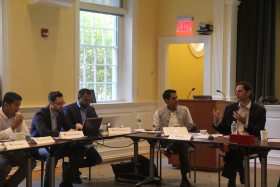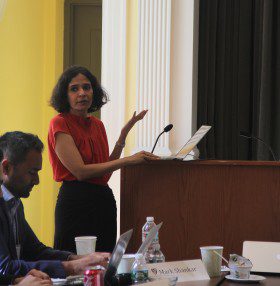 On September 22 and 23, 2016, the South Asia Institute organized the Exchanging Health Information Seminar, supported by the Radcliffe Institute for Advanced Studies. The seminar, organized by Dr. Satchit Balsari (Harvard T. H. Chan School of Public Health), Malavika Jayaram (Berkman Center / Digital Asia Hub), and Professor Tarun Khanna (Harvard Business School), sought to identify the technical and policy barriers to better health information exchange, with a focus on India.
On September 22 and 23, 2016, the South Asia Institute organized the Exchanging Health Information Seminar, supported by the Radcliffe Institute for Advanced Studies. The seminar, organized by Dr. Satchit Balsari (Harvard T. H. Chan School of Public Health), Malavika Jayaram (Berkman Center / Digital Asia Hub), and Professor Tarun Khanna (Harvard Business School), sought to identify the technical and policy barriers to better health information exchange, with a focus on India.
The inter-disciplinary seminar consisting of physicians, computer scientists, lawyers, and policy makers included Harvard faculty, industry experts, government agencies, health care enterprises, and philanthropic foundations. Seminar deliberations were particularly salient given India’s imminent announcement of the National e-Health Authority (NeHA), a regulatory body overseeing health information flow.
 Much of the discussion during the first day focused on the current state of health information in India – focusing on the heavy reliance on paper records, silo-ed health databases, and little-to-no information exchange between the private and public sector. The seminar’s interdisciplinary architecture allowed participants to jointly explore technical and policy solutions to clinical needs, acknowledging the discordance that arises when technology, law, and behavior (user adoption) do not proceed in sync.
Much of the discussion during the first day focused on the current state of health information in India – focusing on the heavy reliance on paper records, silo-ed health databases, and little-to-no information exchange between the private and public sector. The seminar’s interdisciplinary architecture allowed participants to jointly explore technical and policy solutions to clinical needs, acknowledging the discordance that arises when technology, law, and behavior (user adoption) do not proceed in sync.
Participants recognized the potential for harnessing technological advances in India, including the ubiquity of cell phone penetration and the national biometric-based identification system, Aadhar, and their combined role in leapfrogging “fintech” services into the future. A strong case was made for the adoption of API-based health information ecosystem, acknowledging the limitations posed by the widespread lack of digital health information, with some exceptions in large private hospitals. Participants recognized the need to reframe health data ownership in terms of control, consent, and access, and explored the possibility of block chain technology as a potential solution for health information exchange architecture.
The Seminar will be followed by a series of events in India, in partnership with stakeholders in the public and private sector, with the goal of supporting technical and policy needs in framing India’s health information architecture. A white paper based on the seminar proceedings will be released shortly, and available online.
